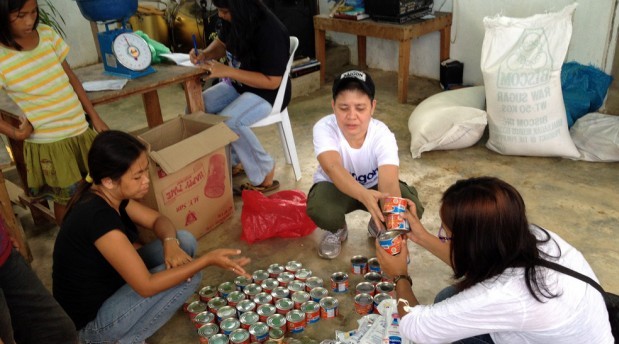Bad weather disrupts aid–UN report

Volunteers pack relief goods donated from Kodiak, Alaska, to be distributed to Supertyphoon “Yolanda” victims in Isabel, Leyte. As heavy rains hamper activities to help victims of Yolanda, the need for food aid might extend until the next rice planting season in May, according to the UN Office for the Coordination of Humanitarian Affairs. AP FILE PHOTO/KODIAK FILIPINO BIBLE CHURCH, REMIGIO BELEN JR.
Bad weather lingering over areas in Eastern Visayas destroyed by Supertyphoon “Yolanda” is disrupting humanitarian operations, according to reports consolidated by the United Nations.
The reports, put together by the UN Office for the Coordination of Humanitarian Affairs (OCHA) in a consolidated report dated Jan. 14, showed that some organizations involved in the distribution of emergency food aid and rice seeds, and those engaged in cash-for-work programs were experiencing hardship on the field due to increased risks of landslides and floods.
The risks are high, especially in remote inland and highland areas, said the report released by UN coordinator to the Philippines Gemma Cortes on Wednesday.
The OCHA report said the distribution of food, livelihood and cash assistance to victims of Yolanda slowed down or were stopped by organizations involved in humanitarian aid due to continuing rain brought initially by a low pressure area that is now a tropical depression.
The risk of flash floods and landslides has increased in some areas due to land erosion, which might endanger both the responders and beneficiaries, the report added.
Article continues after this advertisementThe report, however, did not identify the areas at risk to flooding and landslides.
Article continues after this advertisementThe OCHA report said response operations would return to normal as soon as weather conditions improve.
The UN and organizations involved in humanitarian efforts intended to continue emergency food and aid distributions until the next rice production season in May 2014, the report said.
The OCHA emphasized that remote inland and highland areas should be prioritized because some farmers whose crops were destroyed by Yolanda have not yet received assistance.
The UN body also reported that some affected people in “underserved areas,” which were not specified in the report, walked up to half a day to access assistance given by organizations.
The OCHA report revealed that the Department of Agriculture estimated that some 154,954 farming households and 48,915 fishing households (corresponding to 400,000 people) were directly affected by the typhoon in Western and Eastern Visayas.
At least 33 million trees were damaged in Eastern Visayas, which removed the source of livelihood of farmers and which could have provided them steady income for the next six to nine years.
The report said most of the farmers who have not yet received assistance were in highland, hard to reach areas in Eastern Visayas, according to international organizations helping in relief work in the region.
In a previous interview, Cortes told the Inquirer that the UN intended to stay in the Philippines for at least six months from when Yolanda struck on Nov. 8, 2013, or until such time that rehabilitation efforts produce considerable changes in the lives of the typhoon victims.